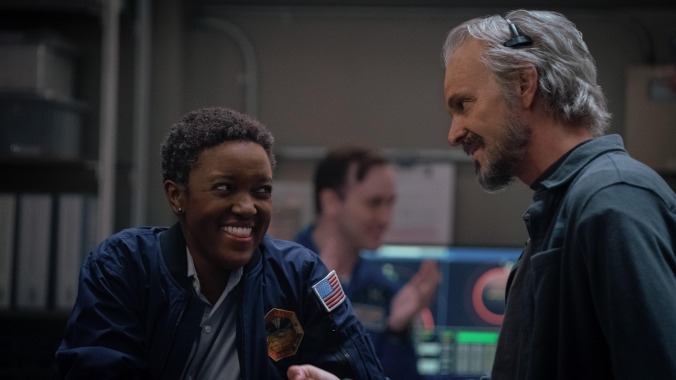For All Mankind season 4 review: One giant, soapy misstep
In the Apple TV+ show's most tedious season yet, Ronald D. Moore's series struggles to balance space thrills and emotional arcs

For All Mankind began as a transfixing space odyssey. Ronald D. Moore’s audacious drama—arguably the best Apple TV+ original when the streaming platform launched in November 2019—immediately stood out with its unique blend of retro-futurism, nostalgia, and sci-fi-driven technological advancements. Set in an alternate history, it turned a colossal topic like the space race between the U.S. and Russia into an agonizing, rousing TV show about humanity’s potential. And despite the larger-than-life subject matter, it remained character-driven at its core. Unfortunately, four years later, this becomes the show’s downfall.
In season four, which premieres November 10, For All Mankind loses its electrifying luster as it jumps to the early aughts. The protagonists, both old and new, are saddled with serious soap opera-level storylines, placing the show’s usual space thrills on the back burner. FAM isn’t able to find the balance between its two main features. There’s no gratifying sense of urgency, adventure, or tension from its interstellar setting, at least not in the seven of 10 episodes screened for critics. It’s especially disappointing because much of the action takes place on Mars, and yet the final result is as dim as a faded star. (The visuals, on the other hand, remain as bright and breathtaking as ever.)
Gone are the days FAM spent time developing its cosmic discoveries. Remember the anxiety of watching astronauts scavenge the lunar surface for ice or trying to escape a solar storm? Or the heartbreak of seeing Gordo (Michael Dorman) and Tracy (Sarah Jones) die on the moon after they used duct tape as a spacesuit to save their compatriots? That level of storytelling has evaporated. Hell, even trying to land an MSAM rover safely would be exciting to witness at this point. The season-four premiere delivers a major space-related event, but after that, the show slowly plunges in quality.
Mars is now nothing but Earth 2.0.—and a bold testament to how humanity will destroy itself, no matter what planetary frontier it conquers. Capitalism and nationalism prevail over scientific accomplishments for the residents of Happy Valley, led by beloved returning favorites Dani Poole (series MVP Krys Marshall) and Ed Baldwin (Joel Kinnaman, sporting an atrocious wig and bad makeup to look older). It’s anything but happy here, though. In the show’s version of 2003, in which it takes roughly only a month to get to the Red Planet safely, private company Helios has sent too many low-level workers to space. They’re treated as underpaid second-class citizens on an expanding base, prompting newcomers like Miles (Servant’s Toby Kebbell) and Samantha (Tyner Rushing) to embark on a quest for equality. A necessary class war has come to Mars, and by the looks of it, it’s here to stay.
The winning curiosity that previously drove so much of FAM takes a back seat to some dragged-out, redundant narrative threads. It’s not entirely surprising, as the show adheres to its established format of jumping almost a decade ahead with each season. By the time the fourth season begins, eight years have passed since the events of the season-three finale. The burden of letting us know what happens during that time falls on a stunning opening scene that, as always, uses modified news clips to do the job. So by the time we meet Ed, Dani, and the rest of the crew again, the show needs to infuse fresh melodrama to keep the story moving.
FAM’s advantage is that viewers are already invested in the longtime characters, so when Dani and Ed still greet each other with a “Hi, Bob!” it has a familiar comfort. But even their dynamic spins in circles as they disagree yet again, potentially reaching a point of no return. Meanwhile, Aleida (Coral Peña) and Kelly (Cynthy Wu) consider what their careers might be outside of NASA. And Helios’ former CEO Dev Ayasa (Edi Gathegi) plots his big return to the industry, while Margo (Wrenn Schmidt) suffers alone in Russia, repenting for the actions that got her there. But none of it is nearly as riveting as before.
As mentioned above, with each passing year, the show challenges itself to portray its version of reality that’s increasingly wonderful, scary, and pointedly different from the actual world. Here, humans are on Mars trying to lasso an asteroid into its orbit. It’s bonkers, but that’s the point. Sadly, though, we see very little of it. And because season four’s alternate-history timeline is closest to our present day, FAM loses the nostalgic feel it had when depicting the ’70s, ’80s, and ’90s. Beyond that, these new episodes just haven’t figured out what journey they want to take.
For All Mankind season 4 premieres November 10 on Apple TV+